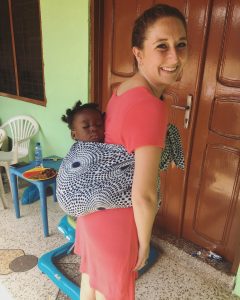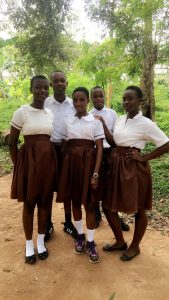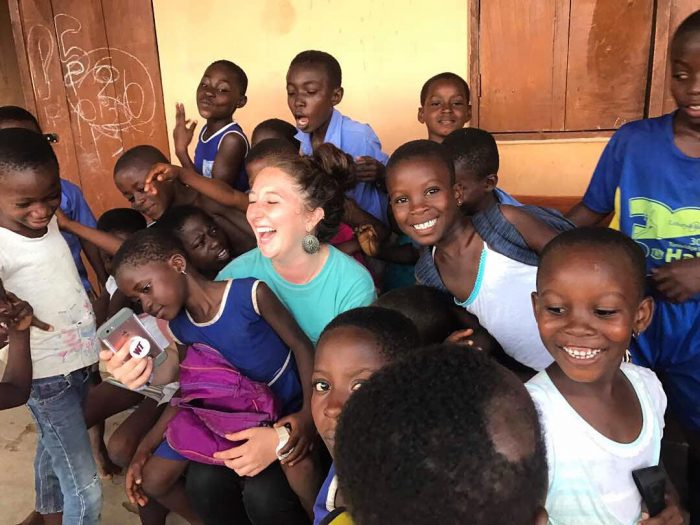I close my eyes and listen to the conversations happening around me. I don’t always understand what is being said because, most often, it is in Twi, but occasionally, a few English words will be thrown in so I can somewhat stay on track. It is a cloudy, cool day with the warmth of family all around me. I’m pulled back into reality when I hear, “Oh, sister Efia.” Efia, meaning Friday born, that is my name around the house, along with “Auntie”, “Nicole”, and “Hopey!” I look around as my mother is stirring rice, and my sisters are cutting vegetables. One of the little ones begins to cry and as I glance over I ask, “can I try?”  and point to my back. Ghanaian women carry their babies on their back and I have watched my sisters and mother, more than once, quickly and efficiently place and wrap a baby on their back. Then, within a few minutes, the baby sleeps. My sister, Elsie, smiles the smile she gives me when I can tell she is proud of me and says, “sure!” She places Jace on my back, and talks me through, step by step, the process of wrapping and securing the little one. Jace would be considered my nephew, and being only 9 months old, he is the youngest person in the household. As Jace begins to fuss, I walk around the porch. My walk is a bit altered, walking more on my toes, so that I add a little bounce in my step, and as I begin to hum the rhythm that all the women in my family use to soothe the babies that are sleepy but avoiding sleep, I feel him begin to relax. I glance back, hoping to see if he was asleep, and my niece, Yvette, mouths, “he is sleeping.” A sense of pride wells up inside me. I felt like I had just passed a test, just stepped through a rite of passage within the Ghanaian culture, and more specifically within the women.
and point to my back. Ghanaian women carry their babies on their back and I have watched my sisters and mother, more than once, quickly and efficiently place and wrap a baby on their back. Then, within a few minutes, the baby sleeps. My sister, Elsie, smiles the smile she gives me when I can tell she is proud of me and says, “sure!” She places Jace on my back, and talks me through, step by step, the process of wrapping and securing the little one. Jace would be considered my nephew, and being only 9 months old, he is the youngest person in the household. As Jace begins to fuss, I walk around the porch. My walk is a bit altered, walking more on my toes, so that I add a little bounce in my step, and as I begin to hum the rhythm that all the women in my family use to soothe the babies that are sleepy but avoiding sleep, I feel him begin to relax. I glance back, hoping to see if he was asleep, and my niece, Yvette, mouths, “he is sleeping.” A sense of pride wells up inside me. I felt like I had just passed a test, just stepped through a rite of passage within the Ghanaian culture, and more specifically within the women.
B ut, as I walked around, carrying that sweet, sleeping babe on my back, I couldn’t help but think that as a teacher this was my job. My job to not only learn the culture here, and try new things, but to carry my students. Not a physical carry, although the little ones in my house need that, but a carry of support. Help them to understand, learn and grow to their full potential. I know that my 4-Hers will come to me for guidance and support, the younger students, the ones in the primary school, will then go to those older students for the same thing. I must remember that my job is to carry the future, give them a structure to lean on, so that, in time, they can pull away and grow and succeed on their own. Like the old cliché goes, “to spread their wings and fly.” They cannot do this on their own, and there will be moments when they feel nervous. I can assure you, the first time that I asked to carry Jace on my back, there was only a small amount of confidence within me. I was nervous and scared that I would not be able to understand the wrapping of the cloth, or be able to give him enough assuring comfort for him to fall asleep.
ut, as I walked around, carrying that sweet, sleeping babe on my back, I couldn’t help but think that as a teacher this was my job. My job to not only learn the culture here, and try new things, but to carry my students. Not a physical carry, although the little ones in my house need that, but a carry of support. Help them to understand, learn and grow to their full potential. I know that my 4-Hers will come to me for guidance and support, the younger students, the ones in the primary school, will then go to those older students for the same thing. I must remember that my job is to carry the future, give them a structure to lean on, so that, in time, they can pull away and grow and succeed on their own. Like the old cliché goes, “to spread their wings and fly.” They cannot do this on their own, and there will be moments when they feel nervous. I can assure you, the first time that I asked to carry Jace on my back, there was only a small amount of confidence within me. I was nervous and scared that I would not be able to understand the wrapping of the cloth, or be able to give him enough assuring comfort for him to fall asleep.
I know that at times being a leader and a guiding light for students is exceptionally challenging and nerve racking and even more so when, in return, those students are to be leaders. Nerves are normal, but so are instincts. After the nerves settle, instincts begin to kick in. The instincts that develop the youth of today, into the leaders of tomorrow, the instincts of support, and comfort, or success and even failure, and the instincts that comes when learning is enjoyable. I know that there will be moments when I am nervous, confused and unsure if I will be able to understand exactly what my students need, but if they are willing, I will wrap them up and help to carry them into their futures. The futures that they build, for themselves.
Hope Sorrells received a bachelors in Agricultural Education and a masters in Agriculture from West Texas A&M University. Before becoming an AgriCorps Fellow Hope traveled to Honduras to study agriculture.


